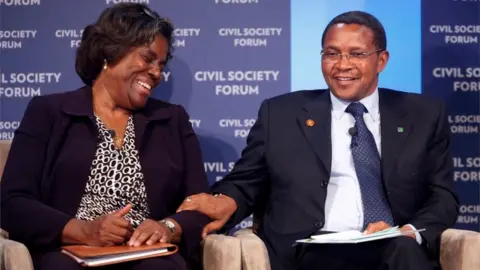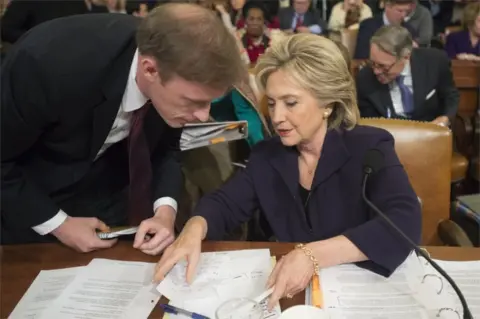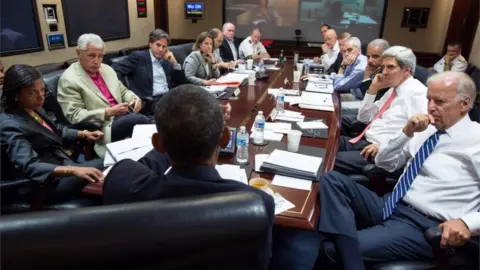What Biden's new foreign policy team tells us
 Reuters
ReutersThe three people chosen by US President-elect Joe Biden to lead his foreign policy team will bring decades of diplomatic experience to the White House, but they also face criticism from those who object to the baggage that comes along with years of serving the US government.
Here's a little on who they are and then what the experts say about the message Mr Biden is sending with his choice of top US diplomats.
Who are they?
The three people who will be advising Mr Biden on issues beyond America's borders are not well known beyond Washington. Antony Blinken, Linda Thomas-Greenfield and Jake Sullivan are all alumni of the Barack Obama White House, and are considered Biden loyalists and foreign policy centrists.
Mr Blinken, 58 - whose work with Mr Biden goes back nearly 20 years - has been picked to serve as secretary of state, the nation's top diplomat.
Linda Thomas-Greenfield, one of the most high-profile black female US diplomats who worked for years on African affairs, has been nominated to serve as US Ambassador to the United Nations.
Jake Sullivan is a former state department official and Hillary Clinton aide who played a key role in negotiating the 2015 Iranian nuclear deal. He served as Mr Biden's national security adviser when he was vice-president.
The insiders
Mr Blinken's work with Mr Biden dates back to his tenure on the Senate Foreign Relations Committee as a Delaware lawmaker. Some critics have blamed him for Mr Biden's vote to invade Iraq in 2003.
That personal connection will serve the team well, say several former US diplomats, but it could also mean a lack of diversity in opinion.
And their wealth of Washington experience as foreign policy veterans will not endear them to all. It does, however, mark a break with Trump's war on the so-called "deep state" - individuals in government he regarded as working against his own agenda.
This is not a team of rivals. While they have a history of working well together, they will also bring complementary perspectives to the Situation Room, with hands-on experience in global conflicts. The value of strategic coherence will outweigh any potential for groupthink. They are not card-carrying members of a deep state, but will help lead a more effective American state focused on shared interests and values. They are pragmatists, not ideologues. PJ Crowley, former US assistant secretary of state
The appointments represent a return to normalcy and an end to an erratic approach to policy. But the question is whether a return to normalcy is enough. This team has a belief in American supremacy which could lead them to recklessness in their use of American military power. Andrew Bacevich, president of the Quincy Institute for Responsible Statecraft
As a longtime foreign service officer, Mrs Thomas-Greenfield in particular, represents the "deep state" that Donald Trump was so dismissive of. For Donald Trump, foreign service officers were the foot soldiers of the liberal internationalism that he wanted to take down. This is partly the reason for why morale is so low at the State Department right now. Charles Kupchan, former member of the White House National Security Council
 Getty Images
Getty ImagesGlobal alliances
Top of the agenda for the Biden team will be re-joining organisations, alliances and treaties that Mr Trump worked to weaken or dissolve over the past four years.
They will be tasked with bringing the US back into the Paris climate agreement and keeping the US in the World Health Organization. They will also seek to revise the Iran nuclear deal, bolster ties with Nato and seek trade agreements as a means to counter China's rising influence.
One of the reasons that Trump was elected was because a large number of Americans judged American foreign policy as having failed. The question is whether this team has learned enough to bring about the changes that we actually need including reducing the military budget and greater restraint in the use of military forces. Andrew Bacevich
Donald Trump never really built a national security team. Instead, he played the Lone Ranger while surrounding himself with independent contractors he could hire and fire by tweet. All three of these officials have served at the Department of State and will place renewed value on international diplomacy and collaboration to solve urgent challenges from the global pandemic to climate change to the China challenge. PJ Crowley
A big challenge is going to be persuading foreign audiences, even partners and allies, that the US is credible in terms of its staying power - that "America is back" as the president-elect has said. This will be the second 180-degree shift in foreign policy in the past four years. The incoming administration has a determination to restore the frayed alliances that the US has relied on for more than seven decades. But they have their work cut out for them. Stewart Patrick, Council on Foreign Relations director of the International Institutions and Global Governance programme
 White House
White HouseReturn of the experts?
Most experts agree that the team Mr Biden is putting in place is more experienced than those appointed by Mr Trump, such as his first Secretary of State Rex Tillerson, who was a former Exxon Mobil executive.
But Mr Trump's legacy at the State Department - which has seen scores of disillusioned diplomats retire early under Mr Tillerson and his replacement Mike Pompeo - run deep and cannot be swiftly overdone overnight.
There has been a significant departure of expertise and experience under both Tillerson and Pompeo. The foreign service bureaucracy has felt generally out of the loop. Normally policy comes up from below, and is filtered through several agencies before reaching the president. That has not been happening under Trump. Charles Kupchan
They have a consistent world view. They are strong believers in American leadership and international alliances. All three have served at the Department of State and will place renewed value on international diplomacy and collaboration to solve urgent challenges from the global pandemic to climate change to the China challenge. PJ Crowley
Reporting by Tara McKelvey and Max Matza
Read more:
